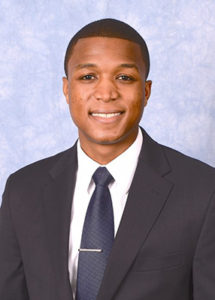By Megan Kramer
Our Strong Coasts team recently welcomed Dr. Joe Bozeman III, PhD, CEM, as the first guest speaker for our 2020 Fall Webinar Series.

Dr. Joe Bozeman III
Dr. Bozeman received his Ph.D. from the University of Illinois at Chicago, and serves as the Chair of the Gordon Research Seminar in Industrial Ecology, and is also a member of the Institute for Environmental Science and Policy. On Tuesday, September 22nd, Dr. Bozeman shared details of his research and unique experiences in a presentation titled, Food Equity and Science Communication Tactics.
Dr. Bozeman opened by providing context for his research topic, considering global urbanization trends and the complex social dynamics that accompany them. He argued that food production is the most significant driver of global environmental degradation, and that understanding the way in which humans engage with this system is important for developing great solutions. Dr. Bozeman’s central research question was, “How do food consumption and spending correlate with food-energy-water (FEW) impacts in the U.S. across race/ethnic groups?”
Through his engaging presentation, Dr. Bozeman walked listeners through the data collection and analysis processes which brought him to some interesting conclusions: while white households in the U.S. spend more on food overall, Black and Latinx households have more of an environmental impact per dollar spent on food, spent a larger percentage of their budget on food than Whites, and accessed food that was of lower nutritional value. To ensure his findings reached the audiences needed to spark beneficial policy change, Dr. Bozeman developed a science communication strategy that he calls MAPPP. He explained his strategy step by step, offering advice based on his recent experiences to the panel full of Strong Coasts Fellows and attentive audience members.
Dr. Bozeman shared that he was successful in communicating the results of his interesting research findings and that they received attention from some major media outlets and social media platforms, such as the New York Post, Sierra Club, and Pacific Standard. However, he warns that such attention often brings with it backlash, and offered valuable insight and advice to those entering a path in research.
We are so grateful to Dr. Bozeman for kicking off our Fall Webinar Series, taking the time to present his research and engage in a lively Q&A session. If you missed it, you can watch the recording below.
We hope to see you at the next webinar when we welcome guest speaker Dr. Cassandra Workman to discuss the topic, Understanding Complex Resource Insecurity: Interdisciplinary Approaches & Future Directions, on October 13, 2020.
Click here to register for Dr. Workman’s webinar!
Click here to register for all future upcoming Strong Coasts events!
About the Author Megan is a first-year graduate student pursuing a Ph.D. in Environmental Engineering at the University of South Florida. She received her BS in Civil Engineering from Gonzaga University, after which she spent nearly two years as a Peace Corps Volunteer in Tanzania. Her service was spent as a secondary school mathematics teacher, though she also supported the school as co-manager for a health/hygiene dormitory improvement project and coordinated interactive HIV/AIDS youth education projects. Megan’s research interests include coastal sustainability, reef restoration, and international development.
STRONG COASTS is supported by a National Science Foundation Collaborative Research Traineeship (NRT) award (#1735320) led by the University of South Florida (USF) and the University of the Virgin Islands (UVI) to develop a community-engaged training and research program in systems thinking to better manage complex and interconnected food, energy, and water systems in coastal locations. The views expressed here do not reflect the views of the National Science Foundation.

Comments are closed.